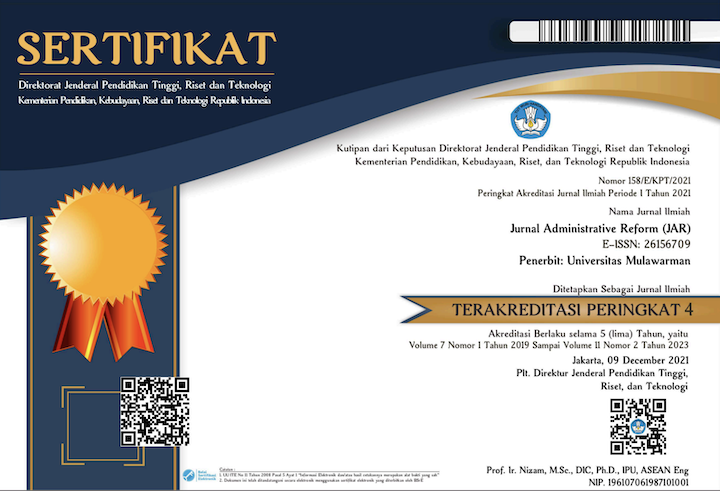FAKTOR-FAKTOR YANG MEMPENGARUHI PENGGUNAAN E-GOVERNMENT PADA PELAYANAN PUBLIK (STUDI KASUS KABUPATEN MADIUN)
Abstract
This study aims to determine the factors that influence the community in the use of e-Government in public services. The development of e-Government in Indonesia has been carried out for more than ten years, but the participation and index of e-Government development in Indonesia based on rankings in Southeast Asia is still low. So it is important in this study to test the independent hypothesis that was built to see the relationship between people's intentions to use e-Government. This research is the result of a questionnaire that has been given by the people of Madiun Regency. The number of research respondents as many as 99 respondents and processed using SmartPLS 3.0 Software. The results showed that of the five hypotheses tested, only two showed a positive relationship with public intentions to use e-Government services. The privacy security factor becomes one of the important roles in increasing public intention to use e-Government services. Meanwhile, trust in the government is a requirement for public participation to participate in the development of e-government services.
Keywords
Full Text:
PDFReferences
Abdelgawad, A., Radianti, J., Snaprud, M., & Krogstie, J. 2016. Simulation models in eGovernment using system dynamics: A literature survey. 2016 IST-Africa Conference, IST-Africa 2016. https://doi.org/10.1109/ISTAFRICA.2016.7530678
Abu-Shanab, E., & Haider, S. 2015. Major factors influencing the adoption of m-government in Jordan. Electronic Government, 11(4), 223–240. https://doi.org/10.1504/EG.2015.071394
Al-Mamari, Q., Corbitt, B., & Gekara, V. O. 2014. e-government adoption and implementation in Oman: A government perspective. In Business Technologies in Contemporary Organizations: Adoption, Assimilation, and Institutionalization (pp. 263–287). IGI Global. https://doi.org/10.4018/978-1-4666-6623-8.ch013
Alghatam, N. H. 2021. e-government through the lens of trading zones: A case of e-government implementation in Dubai. Electronic Journal of Information Systems in Developing Countries, 87(2). https://doi.org/10.1002/isd2.12156
Cardoso, M. A., Telhado, M. J., Almeida, M. D. C., Brito, R. S., Pereira, C., Barreiro, J., & Morais, M. 2020. Following a step by step development of a resilience action plan. Sustainability (Switzerland), 12(21), 1–22. https://doi.org/10.3390/su12219017
Cavalheiro, G. M. D. C., & Joia, L. A. 2016. Examining the Implementation of a European Patent Management System in Brazil from an Actor-Network Theory Perspective. Information Technology for Development, 22(2), 220–241. https://doi.org/10.1080/02681102.2014.910634
Docherty, I., Shaw, J., Marsden, G., & Anable, J. 2018. The curious death – and life? – of British transport policy. Environment and Planning C: Politics and Space, 36(8), 1458–1479. https://doi.org/10.1177/2399654418764451
Faulkner, N., Jorgensen, B., & Koufariotis, G. 2019. Can behavioural interventions increase citizens’ use of e-government? Evidence from a quasi-experimental trial. Government Information Quarterly, 36(1), 61–68. https://doi.org/10.1016/j.giq.2018.10.009
Gil-Garcia, J. R., & Sayogo, D. S. 2016. Government inter-organizational information sharing initiatives: Understanding the main determinants of success. Government Information Quarterly, 33(3), 572–582. https://doi.org/10.1016/j.giq.2016.01.006
He, B. Y., & Chow, J. Y. J. 2020. Optimal privacy control for transport network data sharing. Transportation Research Part C: Emerging Technologies, 113, 370–387. https://doi.org/10.1016/j.trc.2019.07.010
Jiang, H., Wang, S., & Yao, J. 2020. Structuration analysis of e-government studies: A bibliometric analysis based on knowledge maps. Journal of Information Science. https://doi.org/10.1177/0165551520978346
Kasiram, M. I., & Jeewa, A. 2008. Treatment for substance abuse in the 21st century: A South African perspective. South African Family Practice, 50(6), 44.
Komba, M. M., & Ngulube, P. 2014. An empirical application of the delone and mclean model to examine factors for e-government adoption in the selected districts of Tanzania. In Emerging Issues and Prospects in African e-government (pp. 118–129). IGI Global. https://doi.org/10.4018/978-1-4666-6296-4.ch009
Lean, O. K., Zailani, S., Ramayah, T., & Fernando, Y. 2010. Factors influencing intention to use e-government services among citizens in Malaysia. In Citizens and e-government: Evaluating Policy and Management (pp. 334–359). IGI Global. https://doi.org/10.4018/978-1-61520-931-6.ch019
Leclercq-Vandelannoitte, A., & Aroles, J. 2020. Does the end justify the means?Information systems and control society in the age of pandemics. European Journal of Information Systems, 29(6), 746–761. https://doi.org/10.1080/0960085X.2020.1820912
Lizarralde, G., Páez, H., Lopez, A., Lopez, O., Bornstein, L., Gould, K., Herazo, B., & Muñoz, L. 2020. We said, they said_ the politics of conceptual frameworks in disasters and climate change in Colombia and Latin America. Disaster Prevention and Management: An International Journal, 29(6), 909–928. https://doi.org/10.1108/DPM-01-2020-0011
Marschütz, B., Bremer, S., Runhaar, H., Hegger, D., Mees, H., Vervoort, J., & Wardekker, A. 2020. Local narratives of change as an entry point for building urban climate resilience. Climate Risk Management, 28. https://doi.org/10.1016/j.crm.2020.100223
Mellouli, M., Bouaziz, F., & Bentahar, O. 2020. e-government success assessment from a public value perspective. International Review of Public Administration, 25(3), 153–174. https://doi.org/10.1080/12294659.2020.1799517
Mensah, I. K., Zeng, G., & Luo, C. (2020). e-government Services Adoption: An Extension of the Unified Model of Electronic Government Adoption. SAGE Open, 10(2). https://doi.org/10.1177/2158244020933593
Nyirenda, J. C., & Cropf, R. A. 2010. The Prospects for eGovernment and eGovernance in sub-saharan Africa: A case study of Zambia. International Journal of Electronic Government Research, 6(1), 23–45. https://doi.org/10.4018/jegr.2010102003
Panigrahi, P., & Srivastava, A. K. 2016. Effective management of irrigation water in citrus orchards under a water scarce hot sub-humid region. Scientia Horticulturae, 210, 6–13.
Robinson, S. E., Ripberger, J. T., Gupta, K., Ross, J. A., Fox, A. S., Jenkins-Smith, H. C., & Silva, C. L. 2020. The Relevance and Operations of Political Trust in the COVID-19 Pandemic. Public Administration Review. https://doi.org/10.1111/puar.13333
Saleh, C., Hardiwinata, W. H., Mindarti, L. I., & Zauhar, S. 2020. Management of palm oil by the government of the republic of indonesia . Utopia y Praxis Latinoamericana, 25(Extra10), 336–353. https://doi.org/10.5281/zenodo.4155663
Savoldelli, A., Codagnone, C., & Misuraca, G. 2014. Understanding the e-government paradox: Learning from literature and practice on barriers to adoption. Government Information Quarterly, 31(SUPPL.1), S63–S71. https://doi.org/10.1016/j.giq.2014.01.008
Shekhan, M. I., Al-Rodhan, M. A., & AL-Janabi, J. K. 2011. Isolation and Identification of Staphylococcus spp. from Bovine Mastitic milk and their Sensitivity to some Antibiotics at Al-Qadissiyah Province. Al-Qadisiyah Journal of Veterinary Medicine Sciences, 10(2), 12–20.
Sutriadi, R., Ramadhan, A., & Vandanu, H. 2018. From social learning to territorial knowledge based development: Issues in optimizing technopolis in cimahi. 2017 International Conference on ICT for Smart Society, ICISS 2017, 2018-Janua, 1–7. https://doi.org/10.1109/ICTSS.2017.8288874
Szopiński, T., & Staniewski, M. W. 2017. Manifestations of e-government usage in post-communist European countries. Internet Research, 27(2), 199–210. https://doi.org/10.1108/IntR-01-2015-0011
Yabe, T., & Ukkusuri, S. V. 2020. Effects of income inequality on evacuation, reentry and segregation after disasters. Transportation Research Part D: Transport and Environment, 82. https://doi.org/10.1016/j.trd.2020.102260
You, C. 2020. Law and policy of platform economy in China. Computer Law and Security Review, 39. https://doi.org/10.1016/j.clsr.2020.105493
Yuan, F., Li, M., & Liu, R. 2020. Understanding the evolutions of public responses using social media: Hurricane Matthew case study. International Journal of Disaster Risk Reduction, 51. https://doi.org/10.1016/j.ijdrr.2020.101798
DOI: http://dx.doi.org/10.30872/jar.v12i1.7900
Refbacks
- There are currently no refbacks.
Copyright (c) 2024 Jurnal Administrative Reform

This work is licensed under a Creative Commons Attribution-NonCommercial-ShareAlike 4.0 International License.
Jurnal Administrative Reform (JAR)
pISSN: 2337-7542 | eISSN: 2615-6709
Organized and Published by Magister Administrasi Publik - Fakultas Ilmu Sosial dan Ilmu Politik, Universitas Mulawarman
W : http://e-journals.unmul.ac.id/index.php/JAR/
E : jurnal.adm.reform@unmul.ac.id

Jurnal Administrative Reform (JAR) is licensed under a Creative Commons Attribution-ShareAlike 4.0 International License.




